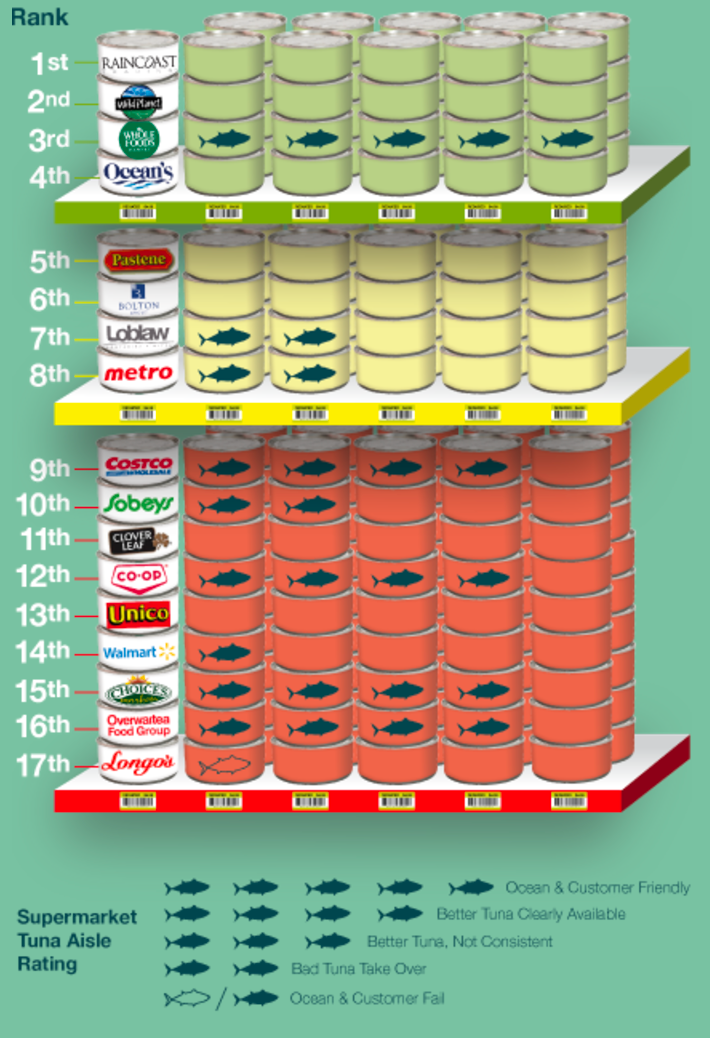
Why Do Unsustainable Tuna Brands Dominate Shelf Space in Grocery Stores?

Greenpeace Canada has released the fourth edition of its Canned Tuna Sustainability Ranking, revealing that despite the number of responsibly-caught tuna products quadrupling in Canada since Greenpeace’s first ranking in 2011, shoppers seeking better options still struggle in some major grocery chains because unsustainable brands dominate shelf space.
“We are seeing more and more responsibly-caught tuna products on store shelves in Canada each year, which is positive for our oceans and tuna customers,” said Sarah King, senior oceans strategist with Greenpeace Canada. “What we are not seeing is strong enough action by major supermarket chains to direct consumers toward those more sustainable options and remove unsustainably-caught tuna from shelves.”
Seventeen companies were assessed by Greenpeace on their efforts to ensure their supply chains meet strong sustainability and social responsibility requirements. Fourteen of these companies offer at least one product caught with more sustainable fishing methods, including pole and line, troll or purse seines fishing without harmful fish aggregating devices (FADs), and five have a commitment to only offer responsibly-caught tuna.
Well-known eco brands top this year’s ranking with Raincoast Trading (1st), Wild Planet Foods (2nd) and Whole Foods Market (365 Everyday brand) (3rd) placing in the green category for their commitments and dedication to only offering more sustainable and socially responsible tuna under their brands. Canada’s second largest tuna company, Ocean Brands, teetered into the green category for achieving its goal to source its “light meat” tuna from more sustainable fishing methods, along with its revamped labour standards and wider plans to tackle its longline-caught albacore to reduce bycatch of non-tuna species.
“With Ocean’s, a major national brand, committing to source from better fisheries for all its products, there is a real opportunity for major positive change in tuna aisles across Canada,” added King. “Offering one responsibly-caught product doesn’t go far enough. While change does not happen overnight, various companies have stalled too long in ensuring their supply chains aren’t putting vulnerable ocean life and seafood workers, at risk.”
In-store surveys conducted across the 10 ranked supermarket chains found that products labeled with a more sustainable fishing method were not easy to find across the board. Responsibly-caught products were reported to be more available and prominent in Whole Foods, Federated Co-operatives (Co-op), Overwaitea Food Group owned stores, Choices Markets and Costco than in the three biggest Canadian chains—Loblaw, Sobeys and Metro. People reported the worst experiences in Walmart and Longo’s, with Longo’s surveys revealing no eco options available. Surveys also revealed that Clover Leaf—a brand with no visible eco options under its flagship brand—took up more shelf space at poorly rated chains, whereas more favorably rated chains had responsibly-caught house brands or Ocean’s, a brand with various responsibly-caught products, as the most prominent products featured.
Greenpeace is calling on tuna buyers in key global markets to only source responsibly-caught and traceable tuna to help protect marine biodiversity and ensure seafood worker safety. Poor supply chain transparency, weak fisheries management and problematic practices such as transshipment at sea continue to create the conditions for illegal and destructive practices.
Shoppers seeking guidance in the tuna aisle are encouraged to consult the ranking and the newly updated Tuna Guide for Healthier Oceans that rates dozens of products beyond the 17 ranked companies.

 233k
233k  41k
41k  Subscribe
Subscribe 
